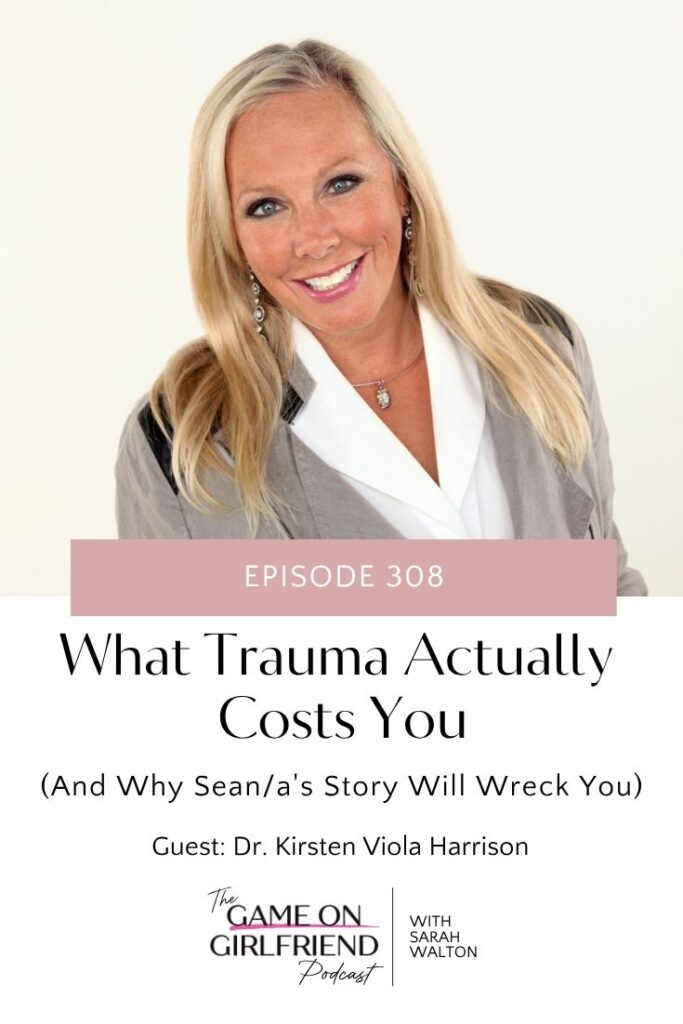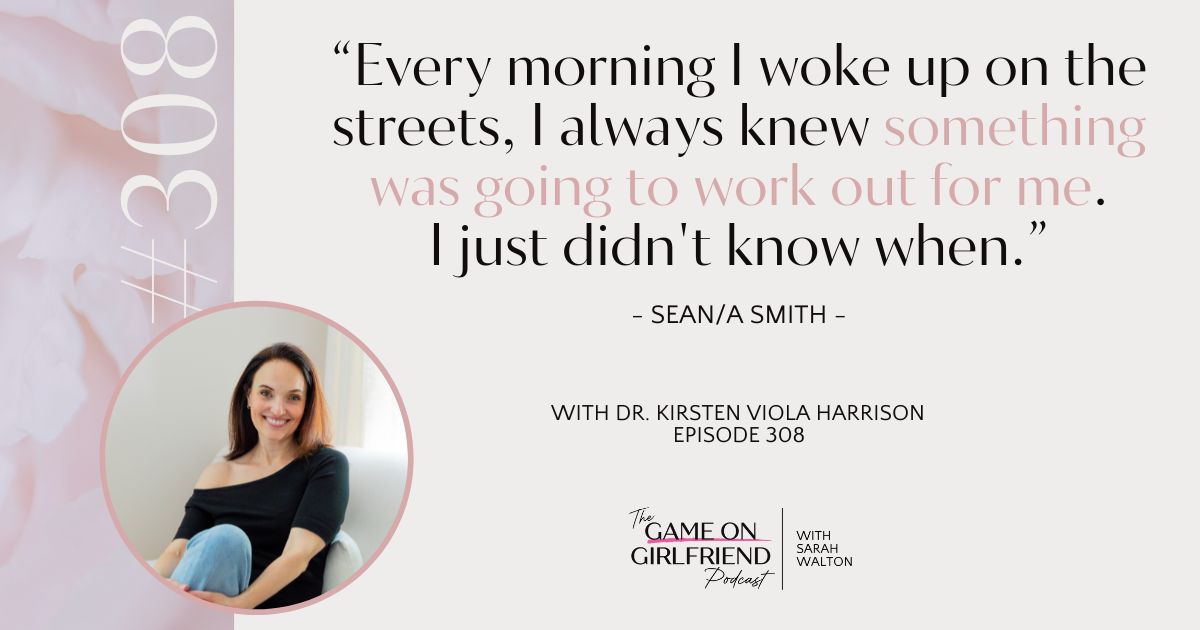Episode 308: What Trauma Actually Costs Entrepreneurs (And Why Sean/a’s Story Will Restore Your Faith) | Dr. Kirsten Viola Harrison

Episode 308: What Trauma Actually Costs You (And Why Sean/a's Story Will Wreck You in the Best Way)
A conversation with trauma psychologist Dr. Kirsten Viola Harrison that'll change how you see everyone—including yourself
We're being really harsh with each other right now. Like, really harsh.
Judging people we don't even know based on a bumper sticker or where they live. Making massive assumptions without ever asking a single curious question.
This week's episode might be the most important one I've recorded in 308 episodes. And I don't say that lightly.
Dr. Kirsten Viola Harrison spent 35 years as a trauma psychologist. She's worked with people who've survived things most of us can't comprehend—severe PTSD, dissociative identity disorder, schizophrenia, near-death experiences that completely rewired how they see reality.
She taught me something that's been rattling around in my brain ever since: trauma isn't just about what happened to you. It's about what your brain did to protect you—and what that protection ends up costing you later.
"Depression, biological depression, biological anxiety—those things are very, very real. The chemicals flooding your brain might be triggered by something from childhood, a memory that's been repressed that's now being activated. Having patience for people who are really going through things and just listening—that's where healing begins." — Dr. Kirsten Viola Harrison
High Achievers Are Often Just High-Functioners
Here's the thing nobody tells you: that executive who never misses a deadline? She might have parts inside that are absolutely struggling. That entrepreneur who looks unstoppable on LinkedIn? She could be compensating for relationships that are completely falling apart.
Dr. Harrison explained this concept called BASC—behavior, affect, sensation, and knowledge. When you're safe and healthy, all four of those things integrate into one complete memory.
But during severe trauma? Your brain splits them apart to protect you. You might remember the sound but not what happened. Feel a sensation without knowing why. It's your brain going, "This is too much. I'm going to help you survive this by breaking it into pieces you can handle."
Brilliant, right? Except those survival mechanisms that kept you alive at seven years old might be completely sabotaging your relationships at thirty-seven.
The cost shows up later—in your relationships, in your ability to be fully present, and in the exhaustion from maintaining different versions of yourself depending on who you're with.

When Your Trauma Becomes Your Superpower (Sort Of)
Dr. Harrison's high school boyfriend spent five years in a South American orphanage, then lived on the streets. That experience—as awful as it was—gave him this uncanny ability to read people in microseconds.
Is this person safe? Will they hurt me? Do I need to run?
His brain learned to slow everything down like a film, breaking every interaction into frames so he could make split-second survival decisions. Later, he became a producer. That same skill made him exceptional at cinematography—seeing what others missed and putting everything together in ways no one else could.
But relationships? Really hard. Because when your childhood teaches you that people abandon you, trust doesn't come easily.
This is what people miss about trauma survivors. They develop these remarkable strengths—reading emotions with scary accuracy, adapting faster when things go sideways, thriving in chaos because it feels familiar.
Those same mechanisms can block intimacy. Prevent vulnerability. Keep people at arm's length even when you're desperate for connection.
"High achievers are often high-functioners—people who've adapted to trauma in remarkably creative ways. The same mechanisms driving your performance might be blocking your ability to actually connect."
The Near-Death Thing That Stopped Me Cold
This part of our conversation was wild. Both severe trauma survivors and people who've had near-death experiences describe the exact same thing: consciousness leaving the body during extreme moments.
Dr. Harrison worked with trauma survivors who described being held by Jesus during abuse. Playing with "angel mommies" while their bodies endured something unbearable. Watching from above, protected.
She heard identical descriptions from people who'd been resuscitated after heart attacks or accidents. Same feeling of leaving the body. Same sense of being held.
Then Dr. Harrison asked the question that shifted everything for me: Does it even matter if it's "real"?
If believing you were held during your worst moment helps you heal, that belief has value. It reduces fear. It dissipates anger. It creates meaning from pain that would otherwise feel completely senseless.
Near-death experiencers talk about life reviews—experiencing their entire lives from others' perspectives. You bullied someone in third grade? You feel exactly what they felt. This creates instant, bone-deep compassion.
Sean/a's Story Will Absolutely Wreck You

Let me tell you about Sean/a, because this is why this episode matters so much.
Sean/a has a college degree. She taught PE. She's also intersex and has schizophrenia. For eight years, she slept on cardboard.
But here's what Dr. Harrison noticed: Sean/a was joyful. She made friends with everyone at the basketball courts. She stayed curious about what each day would bring, even while homeless.
One night, Dr. Harrison ran to the grocery store at 11 PM in a pouring rainstorm. She saw Sean/a outside, shivering in a bikini top. And it hit her for the first time: Sean/a doesn't have a home.
That night changed everything. Dr. Harrison got Sean/a a hotel room. Called the local paper. The community showed up—$26,000 through GoFundMe. Sean/a got an apartment.
In the ten years since that rainy night, Sean/a's never been back on the streets. Not once.
She walks 12-15 miles every day now—her version of therapy. She has a million views on social media. She's traveled to Europe for Pride, advocating for intersex awareness.
Sean/a told Dr. Harrison something that gave me actual chills: "Every morning I woke up on the streets, I always knew something was going to work out. I just didn't know when. I was always curious what the day would bring."
"You never know when life is going to take a dramatic turn. Sean/a had no idea that rainy night would be her last night ever on the streets. Life can change on a dime in the best possible way." — Dr. Kirsten Viola Harrison
Why Curiosity Beats Judgment Every Single Time
Dr. Harrison worked in an inpatient unit for people with dissociative identity disorder. The psychiatrist would ask her, "How do you know what's happening with these patients when I can't figure it out?"
Her answer? "I listen. I sit with them. Sometimes I have chocolate milk with a patient's 'kid part' and just ask what's going on."
One patient was hiding under a table at 6 PM, completely triggered. Nobody understood why. Dr. Harrison asked. The patient said, "Dinnertime was when I got abused. So I get scared."
Of course. It made complete sense once someone actually asked.
This is what we're missing right now. We're so quick to judge, dismiss, and assume we know everything about someone based on absolutely nothing.
Meanwhile, people are carrying experiences that completely explain behaviors we find weird or annoying.
What This Actually Means for Your Business
You might be thinking, "Sarah, why is a business podcast talking about trauma for an entire episode?"
Because you can't separate who you are from how you show up in business.
If you're a woman entrepreneur, you're statistically more likely to have experienced trauma. You're definitely dealing with economic anxiety—70% of small business owners expect a recession. You're navigating a funding landscape where women receive only 2% of venture capital. Your confidence is taking hits from every direction.
Understanding trauma—yours and your clients'—changes how you lead. How you sell. How you show up.
When you recognize that high-functioning doesn't mean healed, you stop just pushing through and start actually addressing what's happening. When you understand everyone's adapting to something you can't see, your marketing gets more compassionate. Your sales conversations go deeper.
Business success isn't just strategy. It's your nervous system. Your capacity to stay present. Your ability to create safety for yourself and others.
The same mechanisms that helped you survive might now be preventing the genuine connection your business needs.
Keep the Faith—Your Story Can Shift in One Moment
Dr. Harrison's message boils down to this: keep the faith. You never know when your story's about to shift.
Sean/a didn't know that rainy night would change everything. Dr. Harrison didn't plan to transform someone's life when she went for dog food at 11 PM.
But one moment of choosing compassion over walking past? Everything changed.
Life can flip on a dime in the best possible way. You don't know who's watching. You don't know what tomorrow brings.
For women entrepreneurs facing all the uncertainty and pressure right now, your circumstances don't define what's possible tomorrow. Your resilience is real, even when it doesn't feel that way.
We're at this fork in the road. We can keep judging and dismissing each other. Or we can get curious. We can recognize we're all carrying invisible battles. We can choose compassion.
This conversation goes so much deeper than what I've covered here. We talk about specific frameworks for understanding dissociative identity disorder, the connection between trauma and spirituality, and practical ways to support people through healing.
Whether you've been through trauma, love someone struggling, or just want to understand what's beneath the surface—this episode will shift something in you.
Get Sean/a's Book
Dr. Harrison's book "I, Sean/a: The Story of a Homeless Intersex Woman Who Inspired a Community" tells the complete story. It's currently at a reduced price on Amazon.
Connect with Dr. Harrison
- Website: SoulWiseSolutions.com
- Instagram: @soulwiseteam
- Facebook: @soulwiseteam
- Twitter: @soulwiseteam
Your Turn
What part of this resonated most with you? Drop a comment—your story might be exactly what someone else needs today.
About Dr. Kirsten Viola Harrison
Dr. Kirsten Viola Harrison is a trauma psychologist, author, and founder of Soul Wise Solutions. For over 35 years, she has helped individuals navigate profound psychological and spiritual transitions — including those living with complex PTSD (C-PTSD), dissociative identity disorder, schizophrenia, and near-death experiences. Her integrative approach blends clinical expertise with compassionate soul work to support true, lasting healing.
She is the co-author of “I, Sean/a: The Story of a Homeless Intersex Woman Who Inspired a Community,” the true account of Sean/a Smith, an intersex woman with schizophrenia whose life defies stigma and inspires change. Together, they advocate for an end to outdated medical practices and a future rooted in dignity and inclusion.
Whether she’s speaking, writing, or working with clients, Dr. Harrison brings insight, depth, and humanity to conversations about trauma, identity, and transformation.
Learn more at soulwisesolutions.com.
Ready to Build a Business That Doesn't Require High-Functioning Mode 24/7?
If this conversation with Dr. Harrison resonated with you—if you recognized yourself in the "high-functioning but not healed" description—let's talk.
I work with women entrepreneurs who are tired of compensating, adapting, and pushing through. Women who want to build businesses that actually support their lives instead of draining them.
Book a free 15-minute call with me. We'll talk about where you are, where you want to be, and whether working together makes sense.
No pressure. Just a real conversation about your business.
About Sarah Walton
Sarah Walton is a business coach, podcast host, and mentor who helps women entrepreneurs build businesses they love. She's the creator of the Abundance Academy, Effortless Sales, and the Game On Girlfriend® podcast. Sarah's mission is to put more money in the hands of more women while teaching authentic, heart-centered business strategies.
Don't miss an episode! Click the button below to subscribe to Game On Girlfriend® podcast on YouTube for more conversations like this.
Binge More Game On Girlfriend™ Podcast Episodes
Something Just for You
Freedom in your business is here. Make revenue that allows you to exhale. Grab my free Freedom Calculator below, and know exactly how much your business needs to make so you can be FREE.



